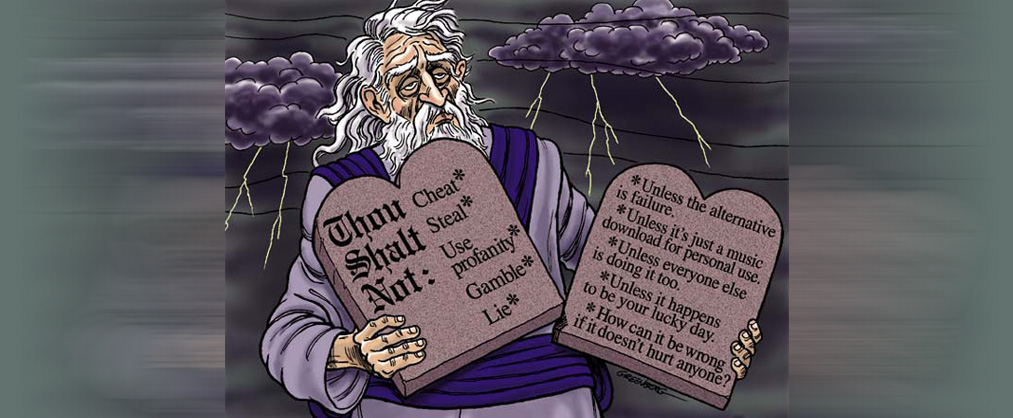Have you heard the claim that the US was founded on Christian values and is therefore a Christian nation?
Freedom of religion is guaranteed in our constitution, and effectively and necessarily means that when it comes to religious or spiritual beliefs of any kind, that you are free to maintain any belief you choose, and conversely you are free to reject any of the many religious and spiritual beliefs that others hold. You are not required to accept other peoples religious beliefs as true.
That fact completely negates any claim that this country was founded on Christianity, but let’s continue…
We are the first country in history to have such a document which is specifically guarantying equal rights for people of all faiths. This document specifically guarantees human rights over the rights of religions or religious organizations to create laws under which people live in this country. This document says that God’s law doesn’t trump the laws of man in the United States.
Before the United States all countries of the western world were ruled in conjunction with their religious leadership. There have been many “Christian Nations” before us and being a nation of Christian believers does nothing to set us apart from any other country that came before us. What does in fact make us distinctly different is our RELIGIOUS FREEDOM!!!
Our freedom to say as we think, our freedom to gather together in groups (right to free assembly), our freedom from oppression, and our freedom to elect our own leaders.
The genius of this document, unlike the bible, is it was designed to be changed.
Over a period of time the document has evolved to specify the freedoms and rights of various groups that historically had been oppressed in religious western Christian led societies, including women and people of various ethnicities, and people who have alternate religious beliefs. Today with respect to human rights, our colloquial definition of the word“man,” as used in the constitution, now includes all humans and not just white male land owners.
While I have no trouble believing that religious people who regularly practice self deception would also try to deceive others in support of their belief in god, it baffles me just how many people have started to promote this complete bullshit when there is a huge amount of historical documentation showing just how disingenuous this claim is. It reflects very poorly on the current state of the education system in this country that one of the most important features of our own history is being misrepresented and people are uncritically accepting it and disseminating it.
What sets this country apart from others in history is that it was founded on the ideals of preserving the rights of man without deference to a god. When all the other countries in Europe were steeped in superstition and religiosity and stagnation for a thousand years it was new thinking, critical thinking, that led to the age of enlightenment and ultimately allowed for a new system of government to be conceived without a basis in religion.
The following links and excerpts should be sufficient to demonstrate where the founding fathers of this country were coming from in terms of religion.
“The government of the United States is not, in any sense, founded on the Christian religion.”
—John Adams
Deists argued that human experience and rationality—rather than religious dogma and mystery—determine the validity of human beliefs. In his widely read The Age of Reason, Thomas Paine, the principal American exponent of Deism, called Christianity “a fable.” Paine, the protégé of Benjamin Franklin, denied “that the Almighty ever did communicate anything to man, by…speech,…language, or…vision.” Postulating a distant deity whom he called “Nature’s God” (a term also used in the Declaration of Independence)
First Amendment
“Congress shall make no law respecting an establishment of religion, or prohibiting the free exercise thereof; or abridging the freedom of speech, or of the press; or the right of the people peaceably to assemble, and to petition the Government for a redress of grievances.”
Our founding fathers explicitly and clearly excluded any reference to “God” or “the Almighty” or any euphemism for a higher power in the Constitution. Not one time is the word “god” mentioned in our founding document.
Jefferson promoted tolerance above all and said earlier that his statute for religious freedom in Virginia was “meant to comprehend, within the mantle of its protection, the Jew and the Gentile, the Christian and the Mohammeden, the Hindoo and Infidel of every denomination.” He specifically wished to avoid the dominance of a single religion.
Declaration of independence (1776):
Articles of Confederation (1777):
Throughout the entire document, in all 13 articles, the only reference to anything remotely relating to a god is a term used one time, “Great Governor of the World,” and even then only in the context of general introduction, like “Ladies and gentlemen, members of the court….” Unlike the Declaration of Independence, this document did indeed seek to create a type of government in the form of a confederation of independent states. The authors gave no power or authority to religion. And this document is our first glimpse into the separation of church and state, because just as the Articles of Confederation give no authority to religion in civil matters, so too does the document deny any authority of government in matters of faith.
U.S. Constitution (1787):
This one is easy, because the Constitution of the United States of America makes zero reference to a god or Christianity. (but for the common use of the date)
The only reference to religion, found in Article VI, is a negative one: “No religious test shall ever be required as a qualification to any office or public trust under the United States.” And of course we have the First Amendment, which states that “Congress shall make no law respecting an establishment of religion, or prohibiting the free exercise thereof.”
Federalist Papers (1787-88)
While Thomas Jefferson was the genius behind the Declaration of Independence, John Jay, Alexander Hamilton and James Madison (publishing under the pseudonym “Publius”) were the brains providing the intellectual foundation of our Constitution.
As with the Constitution, at no time is a god ever mentioned in the Federalist Papers. At no time is Christianity ever mentioned. Religion is only discussed in the context of keeping matters of faith separate from concerns of governance, and of keeping religion free from government interference.
The founding fathers could not be clearer on this point: God has no role in government; Christianity has no role in government. They make this point explicitly, repeatedly, in multiple founding documents. so no, we are not a Christian nation.
George Washington:
Another consideration is an evaluation of the participation of a Founder in the ordinances or sacraments of his church. Most had no choice about being baptized as children, but as adults they did have a choice about participating in communion or (if Episcopalian or Roman Catholic) in confirmation. And few Founders who were Deists would have participated in either rite. George Washington’s refusal to receive communion in his adult life indicated Deistic belief to many of his pastors and peers.
One should consider what friends, family, and, above all, clergy said about a Founder’s religious faith. That Washington’s pastors in Philadelphia clearly viewed him as significantly influenced by Deism says more about Washington’s faith than do the opposite views of later writers or the cloudy memories of a few Revolutionary veterans who avowed Washington’s orthodoxy decades after his death.
———————–
Here, another source regarding George Washington is quite informative.
1. George Washington. The father of our country was nominally an Anglican but seemed more at home with Deism. The language of the Deists sounds odd to today’s ears because it’s a theological system of thought that has fallen out of favor. Deists believed in God but didn’t necessarily see him as active in human affairs. The god of the Deists was a god of first cause. He set things in motion and then stepped back.
Washington often employed Deistic terms. His god was a “supreme architect” of the universe. Washington saw religion as necessary for good moral behavior but didn’t necessarily accept all Christian dogma. He seemed to have a special gripe against communion and would usually leave services before it was offered.
Washington was widely tolerant of other beliefs. He is the author of one of the great classics of religious liberty – the letter to Touro Synagogue (1790). In this letter, Washington assured America’s Jews that they would enjoy complete religious liberty in America; not mere toleration in an officially “Christian” nation. He outlines a vision of a multi-faith society where all are free.
“The Citizens of the United States of America have a right to applaud themselves for giving to Mankind examples of an enlarged and liberal policy: a policy worthy of imitation,” wrote Washington. “All possess alike liberty of conscience and immunities of citizenship. It is now no more that toleration is spoken of, as if it was by the indulgence of one class of people that another enjoyed the exercise of their inherent natural rights. For happily the Government of the United States, which gives to bigotry no sanction, to persecution no assistance, requires only that they who live under its protection, should demean themselves as good citizens.”
Stories of Washington’s deep religiosity, such as tales of him praying in the snow at Valley Forge, can be ignored. They are pious legends invented after his death.
————————
2. John Adams.
The man who followed Washington in office was a Unitarian, although he was raised a Congregationalist and never officially left that church. Adams rejected belief in the Trinity and the divinity of Jesus, core concepts of Christian dogma. In his personal writings, Adams makes it clear that he considered some Christian dogma to be incomprehensible.
In February 1756, Adams wrote in his diary about a discussion he had had with a man named Major Greene. Greene was a devout Christian who sought to persuade Adams to adopt conservative Christian views. The two argued over the divinity of Jesus and the Trinity. Questioned on the matter of Jesus’ divinity, Greene fell back on an old standby: some matters of theology are too complex and mysterious for we puny humans to understand.
Adams was not impressed. In his diary he wrote, “Thus mystery is made a convenient cover for absurdity.”
As president, Adams signed the famous Treaty of Tripoli, which boldly stated, “[T]he government of the United States of America is not in any sense founded on the Christian Religion….”
Another famous quote “Thus mystery is made a convenient cover for absurdity”
— John Adams
In its original context…
“Major Greene this evening fell into some conversation with me about the Divinity and satisfaction of Jesus Christ. All the argument he advanced was, “that a mere creature or finite being could not make satisfaction to infinite justice for any crimes,” and that “these things are very mysterious.” Thus mystery is made a convenient cover for absurdity.”
— John Adams
(1735-1826) Founding Father, 2nd US President
http://libertytree.ca/quotes/John.Adams.Quote.3631
————————
3. Thomas Jefferson.
It’s almost impossible to define Jefferson’s subtle religious views in a few words. As he once put it, “I am a sect by myself, as far as I know.” But one thing is clear: His skepticism of traditional Christianity is well established. Our third president did not believe in the Trinity, the virgin birth, the divinity of Jesus, the resurrection, original sin and other core Christian doctrines. He was hostile to many conservative Christian clerics, whom he believed had perverted the teachings of that faith.
Jefferson once famously observed to Adams, “And the day will come when the mystical generation of Jesus, by the supreme being as his father in the womb of a virgin, will be classed with the fable of the generation of Minerva in the brain of Jupiter.”
Although not an orthodox Christian, Jefferson admired Jesus as a moral teacher. In one of his most unusual acts, Jefferson edited the New Testament, cutting away the stories of miracles and divinity and leaving behind a very human Jesus, whose teachings Jefferson found “sublime.” This “Jefferson Bible” is a remarkable document – and it would ensure his political defeat today. (Imagine the TV commercials the Religious Right would run: Thomas Jefferson hates Jesus! He mutilates Bibles!)
Jefferson was confident that a coolly rational form of religion would take root in the fertile intellectual soil of America. He once predicted that just about everyone would become Unitarian. (Despite his many talents, the man was no prophet.)
Jefferson took political stands that would infuriate today’s Religious Right and ensure that they would work to defeat him. He refused to issue proclamations calling for days of prayer and fasting, saying that such religious duties were no part of the chief executive’s job. His assertion that the First Amendment erects a “wall of separation between church and state” still rankles the Religious Right today.
———————–
4. James Madison.
Jefferson’s close ally would be similarly unelectable today. Madison is perhaps the most enigmatic of all the founders when it comes to religion. To this day, scholars still debate his religious views.
Nominally Anglican, Madison, some of his biographers believe, was really a Deist. He went through a period of enthusiasm for Christianity as a young man, but this seems to have faded. Unlike many of today’s politicians, who eagerly wear religion on their sleeves and brag about the ways their faith will guide their policy decisions, Madison was notoriously reluctant to talk publicly about his religious beliefs.
Madison was perhaps the strictest church-state separationist among the founders, taking stands that make the ACLU look like a bunch of pikers. He opposed government-paid chaplains in Congress and in the military. As president, Madison rejected a proposed census because it involved counting people by profession. For the government to count the clergy, Madison said, would violate the First Amendment.
Madison, who wrote the Constitution and the Bill of Rights, also opposed government-issued prayer proclamations. He issued a few during the War of 1812 at the insistence of Congress but later concluded that his actions had been unconstitutional. As president, he vetoed legislation granting federal land to a church and a plan to have a church in Washington care for the poor through a largely symbolic charter. In both cases, he cited the First Amendment.
One can hear the commercials now: “James Madison is an anti-religious fanatic. He even opposes prayer proclamations during time of war.”
————————
5. Thomas Paine.
Paine never held elective office, but he played an important role as a pamphleteer whose stirring words helped rally Americans to independence. Washington ordered that Paine’s pamphlet “The American Crisis” be read aloud to the Continental Army as a morale booster on Dec. 23, 1776. “Common Sense” was similarly popular with the people. These seminal documents were crucial to winning over the public to the side of independence.
So Paine’s a hero, right? He was also a radical Deist whose later work, The Age of Reason, still infuriates fundamentalists. In the tome, Paine attacked institutionalized religion and all of the major tenets of Christianity. He rejected prophecies and miracles and called on readers to embrace reason. The Bible, Paine asserted, can in no way be infallible. He called the god of the Old Testament “wicked” and the entire Bible “the pretended word of God.” (There go the Red States!)
What can we learn from this? Americans have the right to reject candidates for any reason, including their religious beliefs. But they ought to think twice before tossing someone aside just because he or she is skeptical of orthodox Christianity. After all, that description includes some of our nation’s greatest leaders.
———————————
What the founding fathers of the United States of America have said that contradicts the claim that this nation is founded on the principles of Christianity or as a Christian nation.
John Adams
“The government of the United States is not in any sense founded on the Christian religion.”
– The Treaty of Tripoli article 11, dated 1797
This was unanimously ratified by the US Congress, at the time, for the purpose of clearly stating the official position of the founding members of the government.
Thomas Jefferson
“The Christian god can easily be pictured as virtually the same god as the many ancient gods of past civilizations. The Christian god is a three headed monster, cruel, vengeful, and capricious. If one wishes to know more of this three headed beast like god, one only needs to look at the caliber of people who claim they serve him. They are always of two classes, fools and hypocrites.”
Also Thomas Jefferson writing to John Adams…
“It is not to be understood that I am with him (Jesus) I am a materialist”
Ben Franklin – expressing a deist view.
“I cannot conceive otherwise that he the infinite father expects or requires no worship or praise from us, but that he is infinitely above it”

















